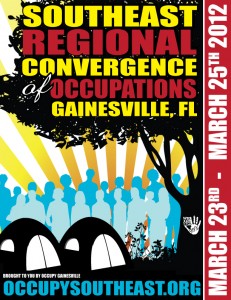 BY LARS DIN
BY LARS DIN
Like many anarchists, when the Occupy Movement first appeared last fall, I was skeptical. What can it really mean for our future that some white people have taken over a square in lower Manhattan? Of course, I had been inspired by the Arab Spring and was certainly curious about this spontaneous global appearance of outrage and activism. Then I read some of the things coming from OWS; what I read didn’t inspire confidence. There seemed to be very little analysis of imperialism, of colonialism, of male supremacy, and so on. And the rhetoric about “reclaiming our country” doesn’t do much for me.
So when I went to the first local assembly here in Gainesville, I was prepared for it not to lead very far. I signed up for a couple working groups, but the chaotic nature of the whole thing had me thinking, “Oh well, that’s that.” I went to a couple general assemblies after that and made some tentative suggestions about the consensus process they seemed to be trying.

